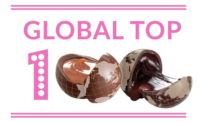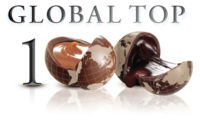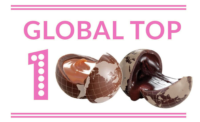Many candy companies have prevailed through the past year despite issues with staffing and getting supplies. Producing viable solutions, new confectionery creations and innovative ways to get delectable candies into the mouths of their customers has been the priority.
Business has been particularly good for some companies.
For instance, PIM Brands, Inc., formerly known as The Promotion In Motion Cos., relocated to Park Ridge, N.J., in June because of significant growth. President and CEO Michael Rosenberg says their business has “exploded in scale and size” and that their former location in Allendale no longer met their needs.
The new headquarters in a roughly 225,000-sq.-ft. building includes a temperature-controlled warehouse to store product samples for distribution to customers, the company's sales force, and trade events. PIM invested nearly $25 million into renovating and expanding the new facilities, according to Rosenberg, including extensive research and development labs, a new pilot plant, consumer sensory, and other scientific labs, and conferencing and meeting space.
That is in addition to the expansion at PIM Brands’ Somerset factory and distribution operations, where it added 80,000 sq. ft. to the existing 200,000-sq.-ft. plant. A new, 350,000-sq.-ft. temperature-controlled distribution center, which holds 46,000 pallets or about 2,000 full truckloads, opened last fall, in addition to its existing 325,000-sq.-ft. temperature-controlled warehouse. PIM converted a 150,000-sq.-ft. raw materials facility into a packaging facility and will soon have a new chocolate and yogurt production operation — currently under construction — bringing its total Somerset footprint to about a one-million-sq.-ft. campus.
As consumers aim to make others feel better during this pandemic, many gift-giving companies have flourished, like 1-800-FLOWERS.COM, Inc.
“We essentially doubled the size of our business over the past three years – and we expect to continue to drive sustainable, long-term revenue growth,” says Kathleen Waugh, of the Carle Place, New York, online gifting company. “The strong growth trends that we were seeing prior to the pandemic were significantly accelerated during the health crisis as customers increasingly turned to our brands to help them stay connected and express themselves.
“Since the start of the pandemic, we’ve become a bigger, stronger, better company with a dramatically larger customer file, continued strong double-digit growth in new customers, and increasing frequency from existing customers. We’re seeing strong growth in our Celebrations Passport loyalty program and in customers buying from more than one product category and/or brand representing our best customer cohorts in terms of frequency, retention, and average spend – and thus customer lifetime value.”
It is not just American products thriving. According to Dulces De La Rosa’s Export Managing Director Armando Crespo V, there has been an “explosion in sales of Hispanic candy.” The Mexican confectioner, based in Guadalajara, Jalisco, has grown more than 38 percent in volume in the last two years.
“This phenomenon is not only due to the growth of the Latino population in the U.S.A., but also across the board millennial target consumers trying new confectionery concepts,” Crespo says.
He says Dulces De La Rosa has started to manufacture industrial confectionery products such as cocoa powder and peanut powder for baking under its successful brand, Mazapan, mainly for coffee shops and ice cream parlors. The company hopes to launch a new snack-filled marshmallow product in the second quarter.
Productos Ricolino, a division of Grupo Bimbo, of Mexico City, has become “a more agile and flexible company regarding its operation,” according to President Fernando Lerdo de Tejada Servitje.
“We’ve developed new inquiring capacities, always knowing we need to remain open-minded in order to learn more about the market needs and changes,” he says. “It is important for us to keep adapting in a nimble way to the new trends.”
The company has developed new formats that make its products more suitable for in-home consumption, for example by launching interactive and playful confectionery products. He notes that Ricolino has been going into new distribution channels, like e-commerce, institutional clients, and offering attractive formats for the wholesaler market.
“We’re working on the diversification of our brands to compete in new product segments like ice cream, chocolate bars, and exploring our brands’ stretchability to make new proposals, like having our own hand sanitizer,” Servitje says.
“Finally, Ricolino is building strong relationships with our clients, consumers and strategic partners through solidarity projects to offer our suppliers a steady growth in their sales. Just to mention a couple of our socially responsible initiatives, we’re working with the small and local goat farmers in San Luis Potosí for the raw material of Coronado, and the artisanal producers of Cacao in Tabasco and Chiapas for KICAO,” he adds.
Yet not every company has had it so sweet. Jean-Marie van Logtestijn of Baronie Belgium NV, headquartered in Germany and Belgium, said mass retail sales were “showing good results” but sales of “out-of-home” and duty-free products have suffered.
“The good results of mass retail balanced out the negative effect of the other two categories,” van Logtestijn said.
Confectioners, including Kras Food Industry of Zagreb, Croatia, can attest to the issues the pandemic has presented across several areas of business.
“The pandemic has introduced some challenges, especially regarding the workforce organization and safety as well as supply-chain optimization to minimize the negative effects of disruption,” says Goran Lovrak, spokesperson for Kras Food Industry. “Home office/work for home is definitely something that will be employed in the future more, regardless of epidemic situation.”
The president of Doúmak Inc., of Elk Grove Village, Ill., agrees. “Like most confectionery companies, it has been very difficult at times throughout the pandemic,” said Don Muff. “Most of the challenges surround supply chain issues, raw material lead times, availability, transportation, and labor. What we initially anticipated as more of a short-term challenge has certainly sustained, but we continue to progress and have positioned ourselves to better handle the ongoing uncertainty of a continued strong global demand.”
Colombina S.A. also faced challenges maintaining supply chain, as well as supporting employees and their families.
“We kept our business running by guaranteeing compliance with all biosafety protocols to safeguard the health of our employees,” says Isabella Henao Vallejo, director of communications for the Cali, Colombia manufacturer. “It was not easy, but thanks to everyone’s commitment, we kept our direct staff on and continued paying their salaries and bonuses on time, and in full. Looking ahead, we find out that COVID-19 has engrained deep lessons in all of us, reaffirming the importance of teamwork, of being supportive and responsible with one’s fellow human beings, and above all, the communication rooted in empathy.”
Colombina saw positive results in its last quarter of 2021, Vallejo says.
“We continue to strengthen our digital platform eB2B (Rall-e Sales) with its own logistics operation in which customers can buy directly from the application,” she says. “At the end of 2021, we expect to sell COP 66,000 million (almost $16 million) through this platform and have 45,000 active clients.”
With $125 million in annual sales, Doúmak historically has been listed in the Global Top 100. Over the past year, Candy Industry compiled three new rankings, with spotlights on top European confectioneries, top South American confectioneries, and top Asian, Australian, African, and Russian confectioneries.
As a result of that additional research, there are new additions, and unfortunately, the same number of subtractions.
New to this year’s list are:
- Want Want China Holdings Inc., of Taiwan, with an estimated $848 million in sales including non-confectionery items, over 42,000 employees and 35 factories.
- Grupo CRM, Kopenhagen Chocolates Brasil Cacau, of Minas Gerais, Brazil, with an estimated $327 million in sales, 1,000 employees and one factory.
- UHA Mikakuto Co., of Osaka, Japan, with an estimated $290 million in sales including non-confectionery items, around 400 employees and four factories.
- Toms Gruppen, of Ballerup, Denmark, with an estimated $224 million in sales, over 900 employees and five factories.
- Kervan Gida Sanayi Ticaret A.S., of Istanbul, with an estimated $193 million in sales, about 2,600 employees and six factories.
- Ismail Industries, of Karachi, Pakistan, with an estimated $166 million in sales, over 2,000 employees and 10 factories.
Since we published our top Asian, Australian, African and Russian confectioneries story, Kervan Gida has acquired the shares of ZPC Otmuchów, one of the leading Polish soft candy producers, and its subsidiary PWC Odra. The companies have four manufacturing plants between them, employing 600 workers. Both supply branded products to retailers such as soft sweets, chocolate, marshmallows, fruit bars and savory snacks, as well as for own-label customers.
Other acquisitions include Universal Robina Corp., of Pasig, Philippines, purchasing Munchy’s, which manufactures chocolate-covered biscuits, and divesting Oceania snack bars. The company said it has had a “relentless focus on the customer and consumer while making sure our employees remain safe.”
Valeo Foods Group, of Dublin, Ireland, purchased German’s Schluckwerder Holding GmbH in January 2021, which expands its confectionery division to 14 plants and 2,780 employees. Schluckwerder had three facilities, 480 employees and earned about €100 million in annual business. Now Valeo Confectionery generates about €465 million ($530 million) in confectionery sales.
Ragolds owner Oliver Schindler now owns 50 percent of Inworld GmbH, both of Germany. Ragolds has started making vegan and vegetarian gummy candies, functional hard candies and chewy candies with collagen and vitamins, functional gummies with vitamins and minerals, and organic toffees and hard candies.
Last April, Nestlé acquired The Bountiful Company for $5.75 billion, which includes brands like Nature's Bounty. Nature's Bounty used to sell Balanced Bar energy bars, but a Nestlé spokesperson confirmed this bar was not part of the acquisition. Net sales from The Bountiful Company will be part of the Nestlé Health Science sales, not confectionery.
Other companies have used the time to reinvent themselves. Ricola has a new modern look, with a redesigned package, logo, and advertising campaign. According to a company statement, “The new positioning builds on Ricola’s cornerstones which have not changed since the invention of the original blend: naturally cultivated herbs, a perfect balance between functionality and enjoyment, and the company's Swiss origins. The new design reflects this with a confident evolution, clearly setting out the brand’s unique claim ‘made with Swiss alpine herbs,’ now locked into a refined more natural logo.”
“Ricola's business – like that of many other companies – was affected by the pandemic,” the company’s letter reads. “However, the company was able to realize a satisfactory result in 2020. Key factors to get through these difficult times were strength, endurance, and flexibility. What is needed in these times, is a high degree of adaptability and also the courage to implement creative ideas despite the current challenges on the market.”
In 2020, the Laufen, Switzerland-based company launched the flavors Berry Medley, Ginger Orange Mint and Pine Resin.
Other changes in 2021 include:
- Delica AG owns Chocolat Frey, of Buch, Switzerland.
- Chocolats Halba/Sunray, of Prattein, Switzerland, is now HALBA, division of Coop Cooperative.
- Kars Nuts, of Michigan, changed its name to Second Nature Brands.
- Ross Born, CEO of Just Born Quality Confections, of Bethlehem, Pa., announced his retirement, but is staying on as CEO until the company finds a replacement.
New product development has helped companies like Bazooka Candy Brands.
“The business has performed very well during the pandemic, driven by the strength of our brand equity and our innovation,” says Tony Jacobs, president of Bazooka Candy Brands, a division of The Topps Co. Inc.
The New York company launched Push Pop Gummy Roll in 2020 and Juicy Drop Dip’n Stix in 2021.
“Both have been very successful and are helping to drive overall growth,” Jacobs adds. “We will be launching a new chewy product in 2022 called Juicy Drop Remix.”
Sunrise Confections, of Mount Franklin Foods, created Sunrise Frupairs, dual-flavored, dual-colored chewy filled ropes available in both assorted and tropical flavors. The El Paso, Texas, manufacturer says the confections and snacks business remains strong and it continues “to look for new, innovative products that appeal to the needs of today’s customers.”
Second Nature Brands has faired well through the pandemic, growing to all-time high in sales and profits, according to Brandi Willard of the Michigan-based company.
“We have been able to bolster customer relationships while accelerating innovation and digital channels,” Willard says.
The Madison Heights, Michigan manufacturer unveiled several new snacks and treats in 2021, designed for nutritionally conscious snacking. The new products include Second Nature Smart Mixes, Sanders Organic Dairy-Free Sea Salt Caramels and Sanders Sea Salt Caramel Thins. The company also will introduce its new Kar’s Snack Max line, a savory, flavor-forward better snack mix.
Justin’s, a division of Hormel Food Corp., has created two new confections, Super Dark Chocolate Peanut Butter Cups and Super Dark Chocolate Espresso Almond Butter Cups, made with 80 percent cocoa and five grams of sugar with no added stevia or sugar alcohols. The Boulder, Colo., manufacturer also introduced multi-packs of their Dark Chocolate Chip Almond Butter Plant-Based Protein bars, four bars per pack.
Meanwhile, Hlebprom, of Moscow, started making chocolate-covered choux pastries.
In addition to the changes to the list, there are a few companies that used to report sales with non-confectionery items included but have started separating confectionery sales out, which makes for a more accurate representation in our list. For instance, Meiji Co., of Tokyo, had total sales of over $10 billion last year, but now has confectionery sales listed separately at ¥120.1 billion ($1.058 billion).
Ezaki Glico, of Osaka, Japan, now reports confectionery sales separately at ¥121.2 billion ($1.067 billion).
Valeo Foods Group, of Dublin, Ireland, created a confectionery division, where its confectionery sales are separate from their other food sales, now at €465 million ($539 million).
Embaré, of Brazil, had total sales of BRL 1.84 billion ($363 million), but recently separated confectionery sales out to $18 million, taking them off the list.




